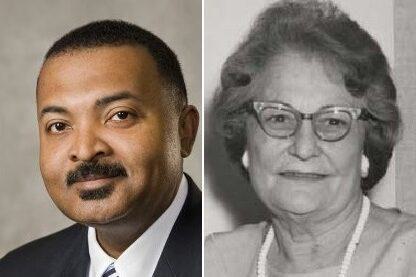Montgomery County Circuit Judge Greg Griffin appointed James White, a certified public accountant (CPA), as a temporary special fiduciary to audit and investigate the finances of the Mabel Amos Trust Fund on Thursday.
The appointment is the latest development in an ongoing lawsuit alleging self-dealing among trustees overseeing a scholarship fund for needy children created by former Alabama Secretary of State Mabel Amos.
The Mabel Amos Trust Fund is worth about $8.2 million, mostly due to oil and gas wells being on its property in South Alabama. Amos was Alabama Secretary of State from 1967 to 1975. She died in 1999.
Allen Dodd, an appointed Deputy Alabama Attorney General, said in a hearing in Montgomery County Circuit Court in July that the state, the fund's board members and the trust fund's trustee Regions Bank recently settled the case. The fund's board members are John Bell, Drew McNeese and Alabama Ethics Commission executive director Tom Albritton.
However, the settlement still has to be approved by Griffin for the litigation to conclude. Griffin said in a filing on Thursday he wanted to let White examine the fund’s finances over the next three months before deciding to approve the settlement.
Montgomery County Circuit Judge Greg Griffin appointed a special master to the case in November, but the Alabama Supreme Court overruled the appointment in May and sent the case back to Griffin.
“There are several bases for this decision. First, it is impossible to determine at this point the extent of the trustees’ breaches of duty, as only the tip of an apparent iceberg of impropriety can be seen. Second, having a Special Fiduciary take possession of the records of the Trust would be superior to identifying in a referral order the specific facts that a Special Master would be limited to addressing. Doing the latter would limit the inquiry into the trustees’ potential misconduct to a “laundry list” that would not include improper scholarship awards and other disbursements not yet known,” Griffin said on Thursday. “The court takes note that the Trust’s tax filings reveal that prior to 2014, the Trust disclosed the names of its scholarship recipients, but beginning in 2014 the trustees did not disclose these names. This failure to reveal the identity of the recipients of the scholarship awards beginning in 2014 allows the inference that it was done for the purpose of impeding any discovery of improper awards. Whether intended or not, this failure to disclose the recipients had the effect of preventing the identification of improper awards without judicial intervention.”
He continued, “Further, the Attorney General and trustees previously announced to the court a proposed settlement “in principle,” but no terms of any proposed final settlement have been filed with or otherwise tendered to the court. A determination by a Special Fiduciary of the extent of the trustees’ breaches of duty would help inform the court’s decision whether to approve any proposed settlement or order other relief, as well as prevent any additional breaches in the interim.”
Griffin also noted that the trust fund’s board engaged in self-dealing by approving scholarships to family members, which violated the trust's terms.
“The information contained in the Trust’s tax filings disclose that the Trust distributed $135,000 in scholarship funds to the children of Thomas Albritton, a trustee of the Trust. These disbursements clearly violated the Trust’s prohibition on private inurement and self-dealing on the part of the trustees, set forth in Article V, part E of the Trust. The tax filings also reveal that the trustees distributed Trust funds directly to third parties that were not 'young men and women of the State' as required by the Trust. The tax filings indicate that in some cases these distributions were not for scholarships, but 'general purposes'; in other cases, where the disbursements went to universities and foundations to create scholarship funds at their respective institutions, the scholarship recipients would be chosen by individuals other than the Board Members of the Trust, a violation of the explicit terms of the Trust,” Griffin said. ”In addition to the improper scholarship awards to non-individuals, it has been specifically and credibly alleged that the Trust awarded scholarships to individuals who were explicitly identified by Petitioner Lindsey as being the children and grandchildren of staff members of the trustees’ law firm, to the child of a former partner and judge before whom the trustees practiced law, and to the children of wealthy clients of their law firm. These scholarships would have served to benefit personally the trustees and would constitute a violation of the private inurement provisions of Article V, part E of the Trust. The extent of these improper disbursements is not currently ascertainable as, unlike the scholarship awards to Thomas Albritton’s children and to the third-party entities, they have not been disclosed in the Trust’s tax filing.”
He added, “The Trust’s tax filings also indicate that after the Trust became wealthy from oil revenue in 2010, Regions Bank greatly increased its charges to the Trust for its administrative services although it spent the same amount of time working on Trust matters both before and after the Trust became wealthy.”
Regions Bank is the Mabel Amos Trust Fund’s trustee.
Mabel Amos Special Fiduciary by Caleb Taylor on Scribd
To connect with the author of this story or to comment, email caleb.taylor@1819News.com.
Don't miss out! Subscribe to our newsletter and get our top stories every weekday morning.










